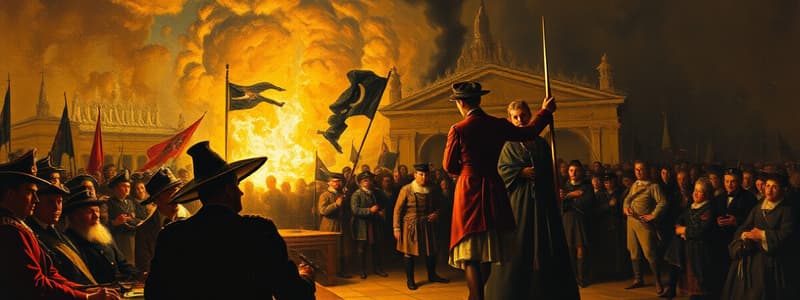Podcast
Questions and Answers
Which document announced the coming of a new time during the French Revolution?
Which document announced the coming of a new time during the French Revolution?
- The Communist Manifesto
- The Declaration of the Rights of Man (correct)
- The Magna Carta
- The Bill of Rights
What significant impact did the French Revolution have on monarchy in France?
What significant impact did the French Revolution have on monarchy in France?
It led to the end of monarchy in France.
In what way did the Russian Revolution differ from the French Revolution?
In what way did the Russian Revolution differ from the French Revolution?
It raised the question of economic equality and the well-being of workers and peasants.
The ideals of equality and freedom became fundamental ideas of a new age after the French Revolution.
The ideals of equality and freedom became fundamental ideas of a new age after the French Revolution.
What was a major challenge faced by the Soviet government after the Russian Revolution?
What was a major challenge faced by the Soviet government after the Russian Revolution?
What did the rise of Nazism in Germany deny various minorities?
What did the rise of Nazism in Germany deny various minorities?
The rise of Nazism is primarily about specific events and massacres.
The rise of Nazism is primarily about specific events and massacres.
The anti-colonial movements produced ideas that were innovative and original during the late ______ century.
The anti-colonial movements produced ideas that were innovative and original during the late ______ century.
Study Notes
Events and Processes
- The French Revolution, Russian Revolution, and the rise of Nazism are pivotal in shaping the modern world.
- Ideas of liberty, freedom, and equality, often taken for granted today, have historical roots exemplified by the French Revolution.
- The French Revolution marked the end of monarchy in France and dismantled a privileged society, paving the way for a new governance system.
- The Declaration of the Rights of Man was a critical document that introduced the notion of individual rights and equality into political discourse.
- Various countries reinterpreted ideas of equality and freedom differently, influencing anti-colonial movements in India, China, Africa, and South America.
The Russian Revolution
- Socialism emerged as a powerful force in Europe, leading to the abdication of Tsar Nicholas II during the Russian Revolution.
- The revolution aimed to address economic equality and improve the conditions of workers and peasants.
- Initial reforms by the Soviet government led to industrialization and modernization in agriculture but restricted essential democratic rights.
- Despite facing utopian aspirations, socialism faces crises in the contemporary world, especially after the dissolution of the Soviet Union.
The Rise of Nazism
- Hitler's ascent and the dynamics of Nazism are a key focus in understanding modern German history.
- Nazism perpetuated systemic discrimination and violence, particularly targeting Jewish populations through a well-coordinated government initiative.
- The Nazi regime operated through various societal layers, establishing schools and concentration camps, showcasing a comprehensive system of oppression.
- Fascination with Hitler in India contrasted with widespread horror regarding Nazism's impact on democracy and social values.
- The modern world narrative includes not only the fight for freedom and democracy but also tales of violence, tyranny, and profound human suffering.
Studying That Suits You
Use AI to generate personalized quizzes and flashcards to suit your learning preferences.
Description
Explore the transformative events of the French Revolution, the Russian Revolution, and the rise of Nazism in this quiz. Understand how these pivotal moments shaped modern ideas of liberty, freedom, and equality. Test your knowledge of their significance in world history.



